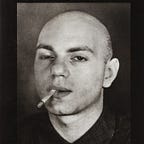31st August 1997 and it’s seventy minutes gone on a hot, humid day in Milan and Inter have just gone one-down against a well-drilled Brescia side, tough like a Little Chef steak.
Immediately Luigi Simoni, Inter manager, calls to the bench.
“Álvaro!” he’s shouts. “Andiamo, Álvaro!” And this little bloke — this round-faced, buck-toothed, twenty-one year old kid just off the plane from Danubio with a bad Byker Grove haircut and a baggy shirt — comes striding up to the pitch.
Not even ten minutes later Álvaro Recoba has his first goal for Nerazzurri, breaking into the Brescia net where even Ronaldo — il Fenomeno, another debutant — could not. Five minutes later, he scores his second. What fucking goals they were. The two goals that won it. Sheer sights to behold.
The first was a stunning hit. A thirty-yard strike that arrowed past the keeper in the sticks, picking up pace mid-air and flying into the top corner. A ball so straight and true it’d have an archer being like “Oh yeah, fair play, mate”. Those who chalk it down to a weak-handed goalkeeper are the kind of sorry bastards that grin with glee when crushing the dreams of young siblings.
“You know that Father Christmas bloke? Fake, him. Not real. Never was. Doesn’t exist. Even if he ever did, he’d be right dead now,” they’d snide at a wailing six-year-old who just came down from the bath. “And Giovanni Cervone should’ve saved that first one from Recoba.”
There’s no mistaking the second. The kind of goal that sends you straight out to the garden to practice, shattering wooden fences into splinters. The second goal was textbook Recoba; the kind of curling free-kick that spat menace and would become his trademark.
Inter hardman Francesco Moriero shined the Uruguayan’s boots in celebration that day.
Despite such a supreme debut, his early years in Milan were spoiled by hatchet men. Hard-faced, flat-footed defenders who stalked him through matches like mafiosi and kicked him into the sidelines in games devoid of the kind of cotton-wool refereeing that stops such atrocities these days. His club loaned him out to Venezia — unfancied, struggling — to toughen him up.
It worked and el Chino weighed in with displays in La Serenissima that would save the side from relegation almost single-handed. He returned to Inter with fanfare ringing out and millions of adulating fans from within and without Italy.
French composer Claude Debussy once said that “Works of art make rules but rules do not make works of art” and Recoba was about as close to that as you could come. A man unencumbered by reason. A man with knees made of pressed biscuit-crumbs and — for, like, a split second — he was regarded as the best in the world. Ephemeral, but it counted. His talent felt ragged and exciting. Fresh and vibrant, like a Montevideo-roadside churrasco chivito.
As a reward, Inter chief Massimo Morratti made him the highest paid player in the world, giving the kid £4million a year. And then things started to slide.
In resulting seasons, his form rarely kept momentum and he struggled to overcome injuries both large and small. In early 2007, when the forward told SKY Italia that he wanted to leave the club in search of more first team chances, few fans begrudged him. Here was a player who still had great love for the game and still had a part to play but his body would continually betray him.
That summer he’d move across the country for a lackluster season at Torino, and then he found himself staring into the abyss, aged 32, forced into the football graveyard of Greece — a move which predictably did little to set him on the right track. In 2009 the Uruguyan agreed to cancel his contract with Panionios, a string of blazing rows and a couple of bad injuries threatening to prove an inauspicious end for one of the game’s flawed greats.
After nine days without a club, his old side Danubio announced his triumphant return to his home country on Christmas Eve. Not so much a step down as a sit-down — a chance to kick back and reflect on his peak and what could’ve been and what so very nearly was.
The history books are packed with players who fulfilled their potential but sometimes, what we really want to see are the magnificent failures. The ecstatic how-did-they-do-that merchants who disappear in a flash. The ones that inspire the romantics, so few and far between. They don’t look like they’ve been created in a lab or like they’re from another planet; they look like kid kicking a flat ball around an estate in their older brother’s kit, running the big lads ragged with twists and turns.
Those are the players who stay with us.
Sam Diss is a writer and an editor of Mundial — follow him on Twitter, @SamDiss.
